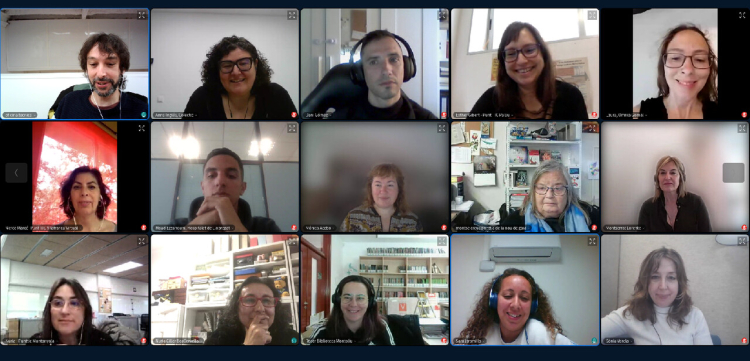Last Tuesday, April 30, the community of the Xarxa Punt TIC had the opportunity to learn more about digital skills. Specifically, the fourth virtual meeting of the year 2024 had around thirty participants, including Sònia Varela from the ACTIC management team of the Generalitat de Catalunya, Moad Ezzanouni from the Punt TIC La Florida - Les Planes and Anna Inglés from the initiative 'Code Club'.
First, the catalan framework and the european framework were presented by Sònia Varela from the ACTIC management team of the Generalitat de Catalunya. Varela defined that a digital competence was the combination of knowledge and digital skills on the part of citizens that allowed a safe, critical and responsible use of new technologies. Varela explained that ACTIC emerged in 2009 with the basic level and the intermediate level and in 2011 it incorporated the advanced level, that in 2016 and 2022 there was an update of contents and that work was currently being done on the new structure, the renewal of the contents and the adaptation of the contents within the european framework. Next, Varela commented that there were currently three levels of certification: basic, with an elementary mastery of the use of ICT and knowing how to develop on a day-to-day basis in the digital world, medium, with a mastery effective use of ICT and having autonomy and critical capacity, and advanced, with a broad mastery of the use of ICT and building alternative uses and supporting other users. In this regard, Varela announced that the european framework provided for five competence areas: search, management and analysis of information, with three competences, communication and collaboration, with three competences, content creation, programming and digital manufacturing, with four competences, security, well-being and civility, with five highly relevant competences, and autonomy and conflict resolution, with four competences.
Secondly, two projects were presented, which were part of the fourth edition of the Congrés de Competències Digitals, where digital knowledge and skills are worked on, by Moad Ezzanouni from Punt TIC La Florida - Les Planes and Anna English from the initiative 'Code Club'. Moad Ezzanouni explained that the Punt TIC La Florida - Les Planes mainly offered support to citizens with the completion of online procedures and organized various types of training proposals to work on digital skills with neighbors. Ezzanouni stated that the Punt TIC dealt with digital gaps and at the same time was a community project, where people came to form a community, to spend time with friends and neighbors. Ezzanouni added that the intention was to ensure that everyone could respond to all kinds of online procedures and that there were all kinds of profiles, elderly people who wanted to get started in new technologies and young people who wanted support for processing online for school pre-registration or rental grants. Ezzanouni concluded by saying that since 2022, 14,000 people had joined. Anna Inglés explained that the initiative 'Code Club' was a long-term project that was currently promoted by Colectic and the Fundació Bofill. Inglés stated that the new edition had emerged in a moment of reflection on the relationship of children with screens and that it sought to go beyond the informative role of technology. Inglés added that any boy or girl should be able to program regardless of their economic or social situation, since knowing how to program brought them closer to the jobs of the future and gave them tools to relate. Inglés commented that the initiative 'Code Club' consisted of a network of programming clubs made up of students and volunteers, which throughout the various editions had managed to have a presence in 160 countries and have 13,000 clubs and 180,000 children participants Inglés pointed out that Colectic was in charge of the coordination between the volunteers and the community spaces that hosted a club and Fundació Bofill of the coordination with the educational spaces and that the new edition raised a proposal of 192 clubs, in the afternoon and extracurricular and with a training itinerary of 32 hours of activities and resources following the computational skills within DigComp2.2. Inglés concluded by saying that the aim was to develop children's computational and creative thinking and work on learning through error, as well as facilitating technological vocations at an early age and breaking down biases so that everyone could access technology. Finally, a round of questions was opened, where some of the facilitators of the Xarxa Punt TIC raised questions about digital skills.



